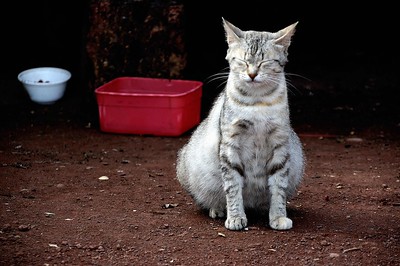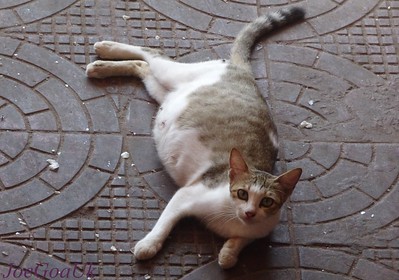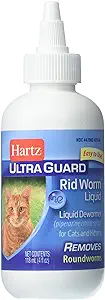Why is your cat's tummy hard?
A hard tummy in your cat is caused by an element of your cat’s tummy being under tension. Since the abdomen consists of several elements and organs, there are several potential causes for why your cat’s tummy is hard.

Causes of a hard tummy in your cat
Muscle tension
A hard tummy in your cat is in most cases caused by your cat tensing up his abdominal muscles. This is what happens when your cat has abdominal pain. You will feel that his entire abdominal wall from his ribs to the back of his pelvis feels hard. There is no difference between the front of the abdomen and the back of the abdomen, although this may be somewhat difficult to feel for someone without experience.
Stomach overload
When your cat has come across something tasty and he doesn’t naturally feel to stop eating when he has eaten enough, it is possible that he will stay eating that tasty stuff. The stomach becomes overfull at that point and when it has reached its extreme point of stretch it will feel hard. The stomach is slightly to the left, in the front of your cat’s abdominal cavity. So if it is mainly that a bulge is visible in the front left and the abdomen feels hard in that place, then there is a good chance that it is a stomach overload. If your cat doesn’t look very ill, you can wait and see what will happen to his hard tummy. It will probably be a lot better tomorrow.
Constipation
It happens with some regularity in cats that they cannot pass their stool. We see this especially in wet, rainy periods. Your cat then holds in its stool a little longer, so that the stool dries in its intestines. At least if you have a cat that poops outside. Because we also see this regularly in cats that don’t come outside to defecate. For them, inactivity and overweight usually play a role in constipation. The faeces accumulate in the intestines, causing the intestines to become overfull and form a hard abdomen. Your cat will also experience abdominal pain, causing him to tighten his abdominal muscles even more. The result is a hard tummy in your cat. It is especially at the back of the abdominal cavity, where the large intestine is located, that you feel that your cat has a hard and full tummy.
Stuffed organs
Of course, there are also quite a few other organs in your cat’s abdominal cavity that can cause your cat’s abdomen to feel hard. For example, a liver tumor can cause a large mass in the anterior part of the abdomen. Liver tumors feel quite hard, which can make your cat’s abdomen feel hard. Abdominal pain often plays an additional role in this and in severe cases they can also get fluid accumulation in the abdominal cavity, which also increases the abdominal size.
But also in the case of a blocked bladder, a hard abdomen can arise. We see this very often in neutered male cats in particular. A urinary stone has become stuck in the penis of a male cat, so that he can no longer empty his bladder. His bladder fills up and tenses up. Your cat also has a lot of abdominal pain and is acting sick or very restless. In principle, he will also try to pee all the time, although many owners don’t see that because a cat is outside.
A pregnant cat
When your cat is pregnant and is already at the end of her pregnancy, she can get a pretty hard tummy. In the end, the kittens take up so much space in her abdominal cavity that there isn’t much room left for the other organs. And the abdominal muscles can’t stretch more either. The result is therefore a hard tummy in your cat. Of course this only happens in unneutered cats, otherwise something else is going on.
Fluid in the abdominal cavity
Actually, this paragraph does not belong under the hard tummy. Fluid in the abdominal cavity usually does not cause a hard tummy, but a large, full abdomen without tension. But we can imagine that you describe this as a hard tummy if your cat has an enormously swollen tummy. This can be caused by a virus that causes peritonitis (FIP), heart failure, a tumor in the abdominal cavity etc.. All are serious conditions so you best will visit your veterinarian.
Worm Belly
We also sometimes see a worm belly in cats. Kittens are particularly sensitive to this, but it certainly occurs in adult cats as well. With a worm belly, the intestines are so full of intestinal worms that the abdomen feels very swollen and hard. Have you not wormed your cat recently? Then you would be wise to do this. If worms are the problem you will see many dead worms in the stool the next day.

What should you do if your cat has a hard tummy?
Blocked urinary tract
What you should do depends a bit on what the cause is and how bad your cat is. If you have a male cat that shows signs of abdominal pain, it is imperative that you see your vet as soon as possible to check that his bladder is not blocked. If this is the case, it can be fatal for him within 24 hours.
Stomach overload
Doesn’t your cat make an overly sick impression and doesn’t he have too much abdominal pain? Then it is best to wait a day and see if it is resolved the next day. If this is the case, then there was probably a stomach overload.
Worm treatment
Haven’t you de-wormed your cat in the past few months? Then it is wise to check whether deworming reduces the hard tummy in your cat. The expectation is that the day after deworming your cat will suffer much less from a hard tummy. In addition, you will also see a lot of dead worms in his stool if this was the cause.
Constipation
If you are pretty sure that constipation is the problem in your cat, you can treat him with Lax aire laxative. But it is wiser to have your vet determine this with certainty first. If your cat needs it, you can give your cat 1.5 inch of this once a day and his constipation should be reduced after about 3-4 days.
When should you see your vet?
Doesn’t all this help? Then it is best to take your cat with his hard tummy to your vet. He can feel your cat’s tummy best and assess the greatest tension in each region and possibly determine the cause that way. Based on this, he will give you advice for further examinations or treatment.
Good luck!
We hope you have found some solutions for the hard tummy in your cat in this article. Good luck for you and your cat in solving this problem. Hopefully he will be fine soon!


